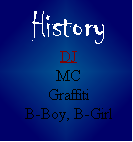






One influence on early emcees were toasts. Toasts were poems that were usually known and recited by those who had been sent to prison. Most dealt with "The Life," which is the lifestyle if a Ghetto Superstar. Someone who pimps hos, deals drugs, drives a Caddy, and has the best cloths. Just like many rappers today. The following toast is entitled "Do You Know What It Means?" It was written down in 1966 and is a short toast.
Do You Know What It Means?
Do you know what it means to wear two-hundred-dollar suits and forty-dollar hats,
To drive through the streets in Fleetwood Cadillacs?
Do you know what it means to have a supply of C and a supply of horse, Not to need any connections because you're the big boss?
Do you know what it means to wear silk shirts on your back and hundred-dollar shoes on
your feet,
To have more people working for you than there are faggots on Forty Second Street?
Do you know what it means to give every young hustler a break,
To fill his pockets with money and his stomach with steak?
Do you know what it means to keep your women in mink and sable
And have Sardi's in New York reserve you a table?
Do you know what it means to have the mob call you King and the cops call you Mister,
To have the D.A. offer his mother and the judge put up his sister?
Do you know what it means? No, you never could know what it means, and you never will,
'Cause you're one of the chumps who pay my bill
In 1973, a group of ex-prisoners called the Last Poets recorded an album of prison
toasts. Their first record contained songs such as "Run Nigger," "When the
Revolution Comes," and "Niggers Are Scared of Revolution." The album sold
over 800,000 copies, despite the fact is got no radio play. Jalal Uridan, the leader of the group, then recorded a
solo album under the name Lightnin' Rod. The title of that album was Hustlers
Convention, and was a large influence on the early MC's. Some songs on the album were
"Four Bitches Is What I Got," Coppin' Some Fronts For the Set," and
Sentenced to the Chair," which were rapped over music by Kool & The Gang, Gene
Dinwiddie and others.
got no radio play. Jalal Uridan, the leader of the group, then recorded a
solo album under the name Lightnin' Rod. The title of that album was Hustlers
Convention, and was a large influence on the early MC's. Some songs on the album were
"Four Bitches Is What I Got," Coppin' Some Fronts For the Set," and
Sentenced to the Chair," which were rapped over music by Kool & The Gang, Gene
Dinwiddie and others.
Back in the fifties radio disc jockeys, like Douglas "Jocko" Henderson, would
use short rhymes to segue between records and between the music and commercials.
Henderson hosted the "1280 Rocket Show" and would say phrases like "From
way up here in the stratosphere, we gotta holler mighty loud and clear 'ee-tiddy-o and a
ho' and I'm back on the scene with the record machine, saying 'oo-pap-doo' and how do you
do!" Many early emcees didn't do too much more than recite a phrase or two in a voice that sounded like a radio DJ's to keep the crowd
movin'. When DJ's began to advance their skill emcees were quick to do the same. MC's like
Grandmaster Caz, from the Cold Crush Brothers, and Melle Mel took the game further and
started telling stories and developing more complex styles.
phrase or two in a voice that sounded like a radio DJ's to keep the crowd
movin'. When DJ's began to advance their skill emcees were quick to do the same. MC's like
Grandmaster Caz, from the Cold Crush Brothers, and Melle Mel took the game further and
started telling stories and developing more complex styles.
As MC's honed their craft and groups started getting record deals emcees started to come
to the forefront, ahead of DJ's who had been the stars of the show and had all the juice.
Rappers wanted a bigger slice of the pie which lead to friction between crews, which lead
the break-ups of Grandmaster Flash and the Furious Five and The Funky 4+1..